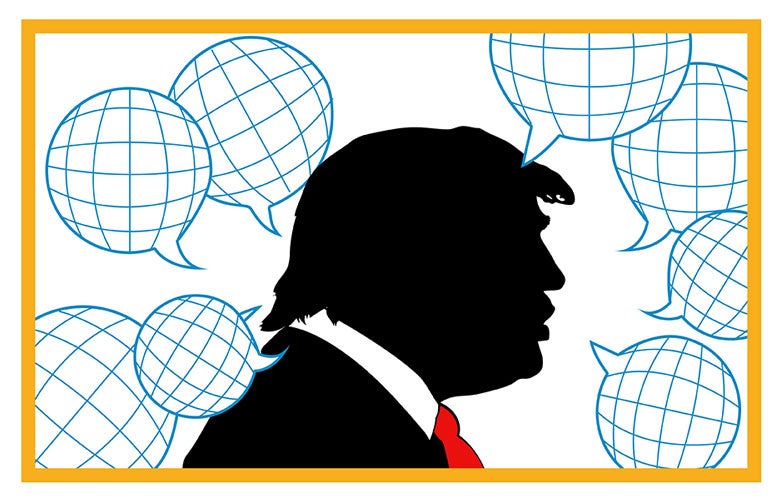In my last post for this blog, in November, I looked at World Politics Review’s big-picture coverage of the future of U.S. foreign policy, examining the ways in which the incoming administration of President-elect Joe Biden would change the United States’ posture toward the rest of the world.
I wrote then that “Biden is likely to completely reverse course on a number of Trump administration decisions pertaining to global cooperation and adopt a much more ‘multilateralist’ foreign policy.”
Changing the direction of the ship of state is likely to be a long process. The first course corrections may seem modest, involving rhetorical demonstrations of renewed commitment to values such as democracy, human rights, the rule of law and international cooperation. In terms of more concrete actions, as WPR columnist Howard W. French has pointed out, the COVID-19 pandemic offers “an unusual, early opportunity” for the Biden administration to reengage with the world by “taking the lead in providing low-cost, or even better, no-cost vaccines to much of the developing world.”
But the long-term project of reestablishing a constructive U.S. role in the world in the wake of the Trump era — and in the context of the ongoing relative decline of American power — may initially take a back seat to addressing foreign policy challenges that require immediate attention.
After all, while observers of international affairs love to talk about grandiose organizing frameworks like the “global order” and national “grand strategy,” in practice foreign policy is often more reactive than proactive, driven by the need to deal with urgent crises as they arise. And if the new administration hopes to signal that “America is back,” as Biden said when he introduced his foreign policy and national security team in November, then it likely will want to first address problems that have the potential to become full-fledged threats to American interests.
What are the most pressing initial foreign policy challenges that the incoming president will face? Although one could easily argue for expanding it, the list below contains four challenges that currently pose significant conundrums for U.S. policymakers and have the potential to become more dangerous if not properly handled.
1. Engaging a nuclear North Korea
“The Korean Peninsula has a way of forcing American presidents to pay attention,” Korea expert Van Jackson wrote in our pages Nov. 24. “Crucial decisions about how to approach negotiations with Pyongyang over its nuclear program, as well as how to manage the U.S. alliance with South Korea, are now overdue.”
Because the nuclear crisis in 2017 had a favorable outcome for North Korea, it’s highly likely that Kim “will soon return to the kinds of provocations that have forced Washington to pay attention in the past,” Jackson argues. “These include nuclear tests, missile tests and incursions into South Korea.”
Though Joe Biden has been a North Korea hawk in the past, opposing diplomacy and advocating for punitive sanctions, he has recently signaled openness to a new approach.
“The current South Korean government fervently hopes Biden will take a more flexible posture in negotiations, consider some unilateral sanctions relief, and endorse the stalled inter-Korean peace process,” writes Jackson. “What happens next depends somewhat on whether North Korea’s signals are belligerent or restrained.”
Follow World Politics Review’s ongoing coverage of North Korea.
2. Preventing a nuclear Iran
Iran’s leadership kicked off 2021 by announcing that it had begun enriching uranium to 20 percent, well beyond the 3.67 percent limit allowed by the Joint Comprehensive Plan of Action (JCPOA), the multilateral nuclear deal negotiated by the Obama administration in 2015.
The move is just the latest in a series of reversible steps the Iranian regime has taken to resume its nuclear program in response to the Trump administration’s withdrawal from the JCPOA in 2018.
“Already last March, the U.N.’s nuclear watchdog said Iran had quickly tripled the size of its nuclear stockpiles to 1,020 kilograms, far above the 202.8 kilograms allowed under the JCPOA,” WPR columnist Frida Ghitis wrote Jan. 7. “By November, the International Atomic Energy Agency reported Iran was holding 2,442 kilograms of enriched uranium — nearly 12 times the limit set out in the nuclear deal.”
Biden has pledged to negotiate a return to the nuclear deal, which would freeze Iran’s development of nuclear weapons. But such a return could be more easily said than done. Ghitis writes that Iran wants back into the deal, but has set some conditions, “which include lifting U.S. sanctions and providing economic compensation for the damage inflicted by them.” And the political calendar in Tehran offers a short window of opportunity for diplomacy, as most observers expect its June presidential election will be won by a candidate representing the regime’s hardline faction.
Both Europe, which has sought to maintain the deal even without the United States, and Israel, which is the U.S. ally with the most to fear from a nuclear-capable Iran, will have a say in how the diplomacy proceeds.
Follow World Politics Review’s ongoing coverage of Iran.
3. The implosion of Venezuela
There is no end in sight to the political and humanitarian crises that have overwhelmed Venezuela and spilled over into neighboring countries for the past several years. The protracted fight for control of the country has only meant additional suffering for its citizens, who are already living in the most dire conditions outside of a warzone in recent memory.
Even if the political stalemate is broken, there are no easy solutions for fixing the country’s economy, which was too dependent on oil and collapsed as global crude prices fell. But President Nicolas Maduro has shown more interest in consolidating his grip on power than making needed structural changes.
In December, the Venezuelan opposition’s plan for dislodging Maduro seemed to end in failure, as Maduro’s supporters took control of the country’s National Assembly in elections the opposition boycotted due to fears they would be as rigged as Maduro’s 2018 reelection. Control of the legislative body had been the legal foundation of opposition leader Juan Guaidó’s claim to legitimacy as interim president since the 2018 ballot.
“Before the vote, Maduro did everything he could to prevent the opposition from competing. The pro-Maduro Supreme Court removed the leaders of opposition parties, replacing them with politicians who had been thrown out of those parties because they were, in fact, Maduro loyalists,” Frida Ghitis recounted in WPR in December. “The court also appointed a new national electoral council in June, ignoring the fact that the constitution grants that power to the National Assembly.”
As Biden takes office, the situation continues to deteriorate, with the economy projected to contract by 25 percent in the coming year.
“The incoming administration is likely to shift Washington’s approach,” Ghitis wrote. “Biden will use more targeted sanctions against individuals in the Maduro regime, while looking for ways to ease the humanitarian crisis in Venezuela and support nongovernmental organizations.”
But there are no easy answers, and at the moment Maduro seems well entrenched — and still incapable of addressing the problems of his people.
Follow World Politics Review’s ongoing coverage of Venezuela.
4. Turkey’s frayed ties with the West
With a sweeping overhaul of Turkey’s political system in 2017, President Recep Tayyip Erdogan cemented his control of the country, threatening its status as a democracy.
Now he has set his sights on greater regional power, using a more adventurous foreign policy to achieve those ambitions — but also to galvanize nationalist sentiments, and thus bolster his support, at home.
“Over the past decade or so, Turkey, a critical NATO member and once-aspiring candidate for membership in the European Union, has refashioned itself as a revisionist power openly challenging not just its regional neighbors but also treaty allies like France and the United States,” Henri J. Barkey, a senior fellow for Middle East studies at the Council on Foreign Relations, wrote in WPR in December.
The specific points of conflict with Western powers, beyond Erdogan’s domestic assaults on democracy and human rights, include his decisions to purchase a missile defense system from Russia and undertake drilling activities in Eastern Mediterranean waters also claimed by Greece and Cyprus.
In response to the purchase of the Russian missile system, the Trump administration imposed economic sanctions and canceled Turkey’s participation in the F-35 Joint Strike Fighter combat aircraft program. The Biden administration is likely to pursue an even harder line, according to Sinan Ciddi, an associate professor of national security studies at the Marine Corps University in Quantico, VA.
“Unless Turkey dramatically alters its course under the Biden administration, it is unlikely that the U.S. government will lift these sanctions, isolating Turkey within NATO,” Ciddi wrote in WPR Jan. 5. “The incoming Biden administration is also likely to more aggressively pursue outstanding criminal cases against Turkish entities that had stalled or slowed under President Donald Trump, which could further embitter bilateral relations.”
Meanwhile, the situation in the Eastern Mediterranean continues to fester, with other European powers supporting Greece and Cyprus. “While Erdogan knows the standoff is damaging his relations with both the EU and the U.S.,” Ciddi wrote, “he prefers to keep Turkish public opinion focused against the West.”



